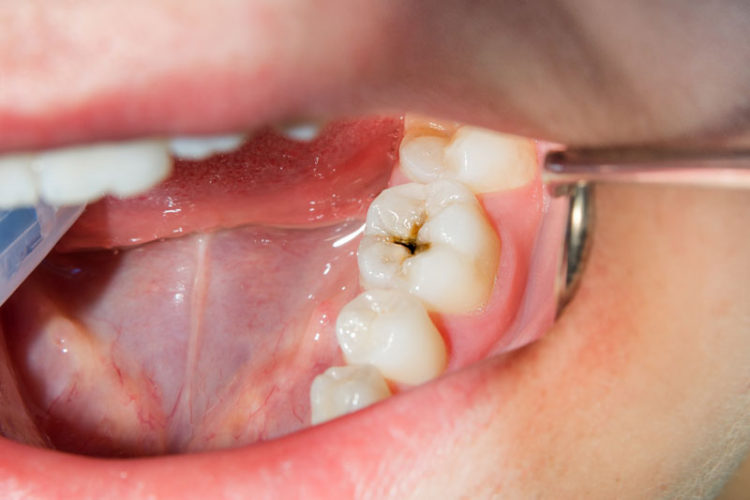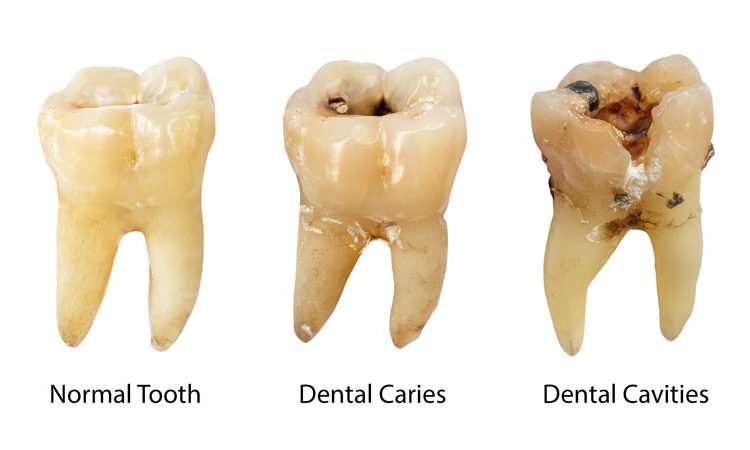As the name suggests, cavities are recesses carved out of the enamel, the hard outer coating of each tooth, by bacteria. This bacteria is called plaque and lives directly on the outer surface of the enamel waiting for their person to ingest food or drink. Now, normally when we eat, the acids in our stomach break down the food and turn it into a sugar called glucose. This can then be used in our bloodstream as energy. This process of turning food (and non-water drinks) into sugar is healthy when it occurs inside the stomach, but plaque breaks down the trace amounts of food and soda pop left on our teeth into sugar outside of our bodies, namely directly on the surface of the tooth.
As the sugar coats our teeth, the bacteria feeding on it produce an acid that eats away at the enamel until it creates a hole in the tooth that, if left untreated, will burrow deeper into the tooth, past the enamel, past the dentin filling, and directly to the pulpy core. This is generally a very painful process for the person getting the cavity.
Making Good Habits
Unfortunately, once tooth decay has affected the enamel to such a degree that it has carved out a cavity, this result is irreversible; once the tooth is damaged, it will remain damaged forever. This is why it is of utmost importance to establish good dental hygiene habits early in life﹘habits such as brushing, flossing, using mouthwash (when of an appropriate age), and visiting the dentist on an annual or semi-annual basis. The earlier these habits can be established, the better, especially for young children who are particularly susceptible to tooth decay and cavities.

The Home Routine
The importance of brushing and flossing to avoid cavities can’t be overstated. Because plaque lives and feeds off of food particles in the mouth, using these tools to remove these substances from the mouth will significantly slow the progression of tooth decay, since the plaque won’t have anything to turn into sugary acid.
Modern toothpaste and mouthwashes are especially adept at fighting and killing the bacteria already alive on the surface of your teeth and nestled on your gums. Taking these steps regularly﹘preferably each morning and night﹘is a great way to not only protect your teeth from irreversible damage but your gums as well.

How Dentists Treat Cavities
Depending on how advanced the state of tooth decay is, dentists have a number of solutions to not only stop the spread of disease but reduce the amount of pain the patient feels. Options include:
- Fillings: The most common way to treat the cavity is to simply fill it in. Usually, dentists use a pasty formula, most often comprised of a type of silver or gold alloy or a resin filled with mercury. Each of these types of fillings is deemed safe by the American Dental Association.
- Crown: When the enamel has almost completely worn away, there can be more cavity than tooth at the affected site. This type of opening to saliva, plaque, and other bits of food can only cause more problems, so dentists create a cap for the tooth and fuse it onto the top.
- Root Canal: A fairly common procedure, especially for baby teeth that are refusing to fall out on their own. In the case of a tooth damaged from decay, untreated rot may be affecting the health of the actual roots of the tooth (connected to the innermost pulp) and will need to be removed entirely. At this stage, the tooth is taken out and the patient will need to consult with the dentist about putting in a false tooth to fill the gap in the gums.
While this information may sound scary, the most worrying part is that tooth decay is the most common disease on the planet, affecting people of all ages, from infancy to old age. With changes to one’s hygiene habits and making a friend of their dentist, a person can avoid most or all of the problems with cavities in their lifetime. For parents of small children, it is important for kids to see their pediatric dentist often, since tooth decay﹘like the common cold﹘can be passed from mouth to mouth at school and at home, just by breathing in the same air as a person with a lot of untreated plaque.




